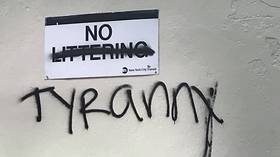From nanny choppers to police break-ins: Top absurd crackdowns in the fight against Covid-19

As coronavirus lockdowns go on without an end in sight, local authorities are testing the limits of their captive populations — from sending helicopters to break up football games, to recording license plates of rogue worshipers.
The coronavirus epidemic has most of the world going stir-crazy under lockdown — except for the police who’ve been given unprecedented powers to enforce a tempting slate of new laws — and a few rules that they seem to be making up as they go along. Here are some of the silliest — and most disturbing.
Also on rt.com Daleks, drones, and high-tech cops: Robots come out on top amid coronavirus pandemicHelicopter parenting
Tunisia, already on the map for sending robotic quarantine-enforcers through the streets of Tunis to check people’s papers, has stepped up its police-state game. Over the weekend, a military helicopter was sent in to break up a youth soccer game that violated the nation’s lockdown order. Video posted to social media of the bizarre intrusion shows the aircraft hovering low enough to kick up huge clouds of dust and make game-play impossible. Sure, we’ve seen this with drones in other countries, but a military helicopter?!
Tunisian army use helicopter to end football match that violated countrywide lockdown (Video: Hamza_Zhiou). pic.twitter.com/xyX44lsdam
— Breaking Aviation News (@breakingavnews) April 12, 2020
Holiday-patrol
Cops around the world have taken a special interest in ensuring people don’t transmit coronavirus while enjoying the warming weather. In the UK, Central Bedfordshire police were slammed for suggesting (complete with a sinister photo) that rural picnickers would be ambushed by the long arm of the law.
Also on rt.com ‘The UK is dead’: Near-unanimous disgust after British police threaten to ‘appear from shadows’ to bust rural picnicsOver in Australia, Tasmanian police warned would-be holidaymakers that even the most remote campsites would be patrolled — by helicopter! — for those trying to take social distancing really, really seriously.
When u social distance so well that the cops have to find u by helicopter pic.twitter.com/iOmd0AOqCf
— Petite Nicoco (@PetiteNicoco) April 12, 2020
Planning a party?
Britain has been home to some of the most absurd examples of overzealous coronavirus policing, from cops threatening to paw through people’s shopping carts hunting for “non-essential” items to businesses being threatened for selling Easter eggs. Those who stayed home were assumed to be safe, however — until now. Over the weekend, video of at least four officers barging into one hapless man’s flat after allegedly receiving a call about a “disturbance” went viral. The un-masked, mostly un-gloved officers attempted to justify breaking down the man’s door and poking around his home for the sake of “social distancing,” but beat a hasty retreat after appearing to realize he was alone.
GRAPHIC: Police smashed a residents door in looking for 'social gatherings'. The police are out of control. These Police should be prosecuted for criminal damage and abuse of power. Got given a right serve. #CoronaPolice#CoronaCopspic.twitter.com/QbJKDWPdFT
— Critical🌀 (@LogicalWeapon) April 13, 2020
While it’s not clear who reported the man, local police forces have been flooded with calls from civilians concerned their neighbors aren’t following the rules — so much so that several municipalities have set up dedicated apps and tip-lines for the junior Stasi-in-training among the population.
Micro-managers
The town of Beverly, Massachusetts has regimented even the sidewalks to stop the spread of coronavirus, in an effort that appears to mock the state’s culture of neurotic rule-following. Like most of the US, Massachusetts is under lockdown, allowing residents out only to exercise and conduct essential business. But local police “noticed there was a tremendous amount of foot traffic and people walking into each other,” Beverly Police Chief John LeLacheur told Fox News last week, explaining the need for the one-way designations. LeLacheur has already suggested the new rules — which carry a $100 fine for the disobedient — will stick around after the pandemic.
#Boston suburb of #Beverly sets up one-way sidewalks to allow residents to practice social distancing - and police will hand out $100 fines to anyone who walks in the wrong direction. Pure madness. Pure police state. What is next? https://t.co/xiWLhgTOGspic.twitter.com/AQ8GDfU6g4
— ✝️ St Michael defend us! (@PrayRosary47) April 12, 2020
Across the pond, Manchester police went further, inventing their own micro-managing rules, as they cornered a man attempting to deliver food to family members and threatened him with pepper spray. The incident in the town of Fallowfield made headlines, and Greater Manchester police apologized to the man and his family, acknowledging “the incident wasn’t dealt with in the professional way we would expect.”
Greater Manchester Police apologises for arresting man and threatening him with pepper spray while dropping-off food for vulnerable mum in lockdown. ‘The incident wasn't dealt with in the professional way we would expect‘ (via @dawkinsreturns) pic.twitter.com/evM4JrStvW
— Julian Druker (@Julian5News) April 11, 2020
That’s hardly all — reports of fines issued for purchasing “non-essential items” have proliferated across social media, even as the UK government reminded police there were no official restrictions on what items could be purchased.
No Easter for you
Churchgoers attempting to celebrate Easter clashed with authorities over the weekend across the US. Cars at a Kentucky church were flyered with intimidating warnings from the local police, even after a federal judge ruled drive-in services — in which worshipers remained in their cars with windows closed, maintaining social distancing — could not be banned. Car owners were informed they would be expected to self-quarantine for 14 days, or risk “further enforcement measures.”
This was left on people’s cars today if they attempted to attend church. The police don’t know if they were socially distancing and wearing masks. They literally just said you can go to Walmart but not to church, and they did it upon orders of @AndyBeshearKYpic.twitter.com/pa5mTn3Ioq
— Doug Stafford (@dougstafford) April 12, 2020
US District Judge Justin Walker didn’t mince words in his ruling against the ban on drive-in services on Saturday. “On Holy Thursday, an American mayor criminalized the communal celebration of Easter. That sentence is one that this Court never expected to see outside the pages of a dystopian novel, or perhaps the pages of The Onion.” Others wondered why it was acceptable to sit in one’s car in a Wal-Mart parking lot, but not on church property.
I am not in favor of Christians physically gathering inside churches during the quarantine. However, if we can park in Walmart, Costco, & liquor stores, prohibiting people from streaming a service inside their cars with windows up in a church parking lot is discriminatory.
— Samuel Rodriguez (@nhclc) April 12, 2020
The coronavirus pandemic continues to rage worldwide, with over 1.8 million confirmed cases as of Monday. The US is home to the lion’s share of those cases — some 558,999 people, most in New York, have contracted the virus, and 22,154 have died with it. Spain and Italy are the next most heavily affected, with 169,496 and 156,363 cases, respectively — though Italy has reported more deaths than Spain. The epidemic, first reported in Wuhan, China in December, quickly spread around the world and cases can now be found in nearly every country.
Think your friends would be interested? Share this story!














